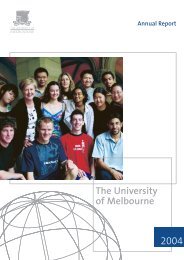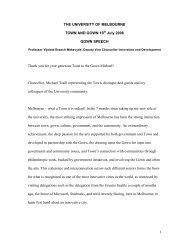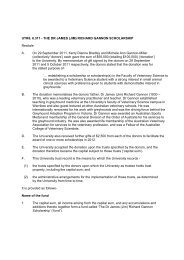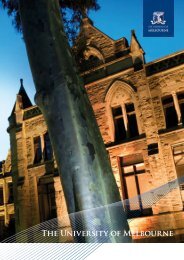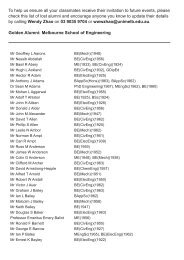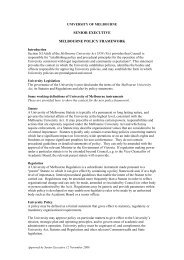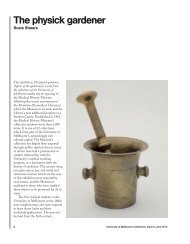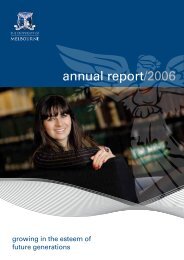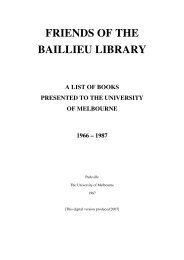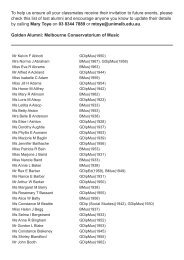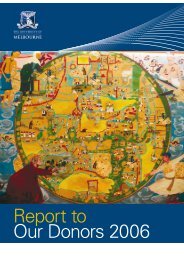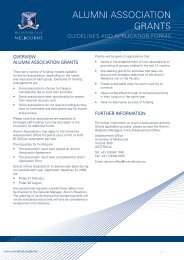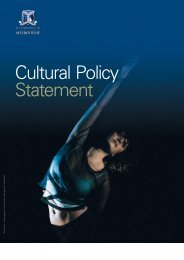2010 International Undergraduate Prospectus nts. u.au
2010 International Undergraduate Prospectus nts. u.au
2010 International Undergraduate Prospectus nts. u.au
You also want an ePaper? Increase the reach of your titles
YUMPU automatically turns print PDFs into web optimized ePapers that Google loves.
Did you know?<br />
The University of Melbourne has<br />
one of the largest psychology<br />
departme<strong>nts</strong> in Australia and has<br />
been teaching psychology for<br />
more than 100 years.<br />
Our research interests and<br />
strengths are in cognitive and<br />
behavioural neuroscience, social<br />
and developmental psychology<br />
and clinical psychology.<br />
You will have the opportunity to<br />
participate in research work as<br />
early as first year through the<br />
Research Participation Program.<br />
43<br />
Psychology has been t<strong>au</strong>ght at the<br />
University of Melbourne for over 100<br />
years and the School of Behavioural<br />
Science is one of the largest psychology<br />
departme<strong>nts</strong> in Australia. Through the<br />
University of Melbourne New Generation<br />
undergraduate degrees, you are able to<br />
study psychology either as an Australian<br />
Psychology Accreditation Council (APAC)-<br />
accredited sequence (through Arts, Science<br />
or Commerce) or as breadth subjects within<br />
your undergraduate degree in Biomedicine,<br />
Commerce, Environme<strong>nts</strong> or Music. No<br />
additional prerequisites are needed to study<br />
psychology in Year 1 once you meet the<br />
entry requireme<strong>nts</strong> for your chosen New<br />
Generation undergraduate degree.<br />
Our research interests are wide and varied,<br />
with particular strengths in cognitive<br />
and behavioural neuroscience, social<br />
psychology, developmental psychology and<br />
clinical psychology.<br />
You have the opportunity to participate in<br />
research work as early as first year through<br />
the Research Participation Program, where<br />
you will be exposed to how research is<br />
conducted.<br />
Careers<br />
Psychology graduates are equipped<br />
with valuable and transferable skills<br />
which open up a wide range of potential<br />
career pathways. Whether you have<br />
studied individual psychology subjects or<br />
completed psychology as an accredited<br />
sequence, your career opportunities are<br />
varied. Some of the skills you will learn –<br />
which are highly sought after by employers<br />
include: analytical and critical thinking<br />
skills, written and oral communication skills,<br />
research skills and critical evaluation skills,<br />
ability to integrate data from disparate fields<br />
into a coherent picture and the ability to<br />
source, assess and interpret data etc.<br />
Psychology graduates are equipped<br />
with skills which open up a wide range<br />
of potential career pathways and career<br />
opportunities. These include journalism,<br />
editing, public relations, teaching, market<br />
research, human resources, business<br />
development, marketing and advertising,<br />
clinical settings, government bodies, and<br />
the world of politics etc.<br />
If you complete a 125-point accredited<br />
sequence, you may apply to study a fourth<br />
year Honours degree or a postgraduate<br />
diploma (see Honours and Fourth Year<br />
section below). However, to be eligible to<br />
register as a psychologist in the state of<br />
Victoria, it is necessary for you to complete<br />
four years of accredited study in psychology<br />
and two years of accredited postgraduate<br />
professional studies to practice. The<br />
courses conducted by the School are<br />
accredited by the Australian Psychology<br />
Accreditation Council (APAC).<br />
Graduates who go on to pursue indepth<br />
training (professional or research<br />
postgraduate degrees) in the psychology<br />
field find employment in a number of<br />
specialised areas. These can include<br />
academic, applied research, clinical,<br />
clinical neuropsychology, community,<br />
counselling, educational, forensic, health,<br />
industrial/organisational, social and sports<br />
psychology. See www.psych.unimelb.edu.<br />
<strong>au</strong>/profession/career/<br />
Professional and international<br />
degree recognition<br />
The undergraduate 125-point sequence,<br />
Honours/Postgraduate Diploma programs<br />
and postgraduate courses are accredited<br />
by the APAC, the accrediting <strong>au</strong>thority for<br />
psychology courses t<strong>au</strong>ght in Australia.<br />
These qualifications are well regarded<br />
overseas.<br />
Knowledge transfer<br />
Connecting with other stude<strong>nts</strong>,<br />
industry and the community<br />
To provide you with a greater understanding<br />
of the discipline and its career prospects,<br />
the School invites practitioners and<br />
prominent figures in the field to speak at<br />
various public lectures and seminars. You<br />
will benefit greatly through your interaction<br />
with these experienced professionals. The<br />
Insight Lectures presented by practising<br />
professionals in the respective fields of<br />
psychology is an especially popular and<br />
beneficial series of lectures for stude<strong>nts</strong>.<br />
Stude<strong>nts</strong> get insight into real issues on the<br />
job, challenges and satisfaction factors that<br />
they can expect when they pursue a career<br />
in the respective fields of psychology.<br />
In addition, you will get the opportunity to<br />
participate in research work as early as year<br />
one through the Research Participation<br />
Program, where you will be exposed to<br />
how research is conducted. There are also<br />
possibilities for you to participate in student<br />
exchange programs and study abroad<br />
schemes at the University.<br />
Honours<br />
The fourth-year program can be undertaken<br />
through an Arts or Science Honours degree,<br />
or the Postgraduate Diploma in Psychology,<br />
both of which are accredited by APAC.<br />
Part-time study is available. The program<br />
comprises four coursework subjects, two<br />
of which are electives, and a supervised<br />
research project. The research project<br />
provides an opportunity to gain experience<br />
in all aspects of conducting and reporting<br />
independent empirical research.<br />
The fourth-year program is rigourous<br />
and places are competitive. Selection is<br />
based primarily on academic performance<br />
in the second and third years of your<br />
undergraduate degree. The objective<br />
of the fourth year program is to help<br />
stude<strong>nts</strong> acquire the knowledge, skills,<br />
and scholarship necessary for achieving<br />
excellence in psychology. More specifically,<br />
the fourth year program will provide<br />
stude<strong>nts</strong> with the opportunities to learn the<br />
intellectual background, ethical principles<br />
and content areas of psychology as a<br />
scientific discipline.<br />
Application is open to graduates of the<br />
Bachelor of Arts or Bachelor of Science<br />
(or equivalent) with an APAC-accredited




